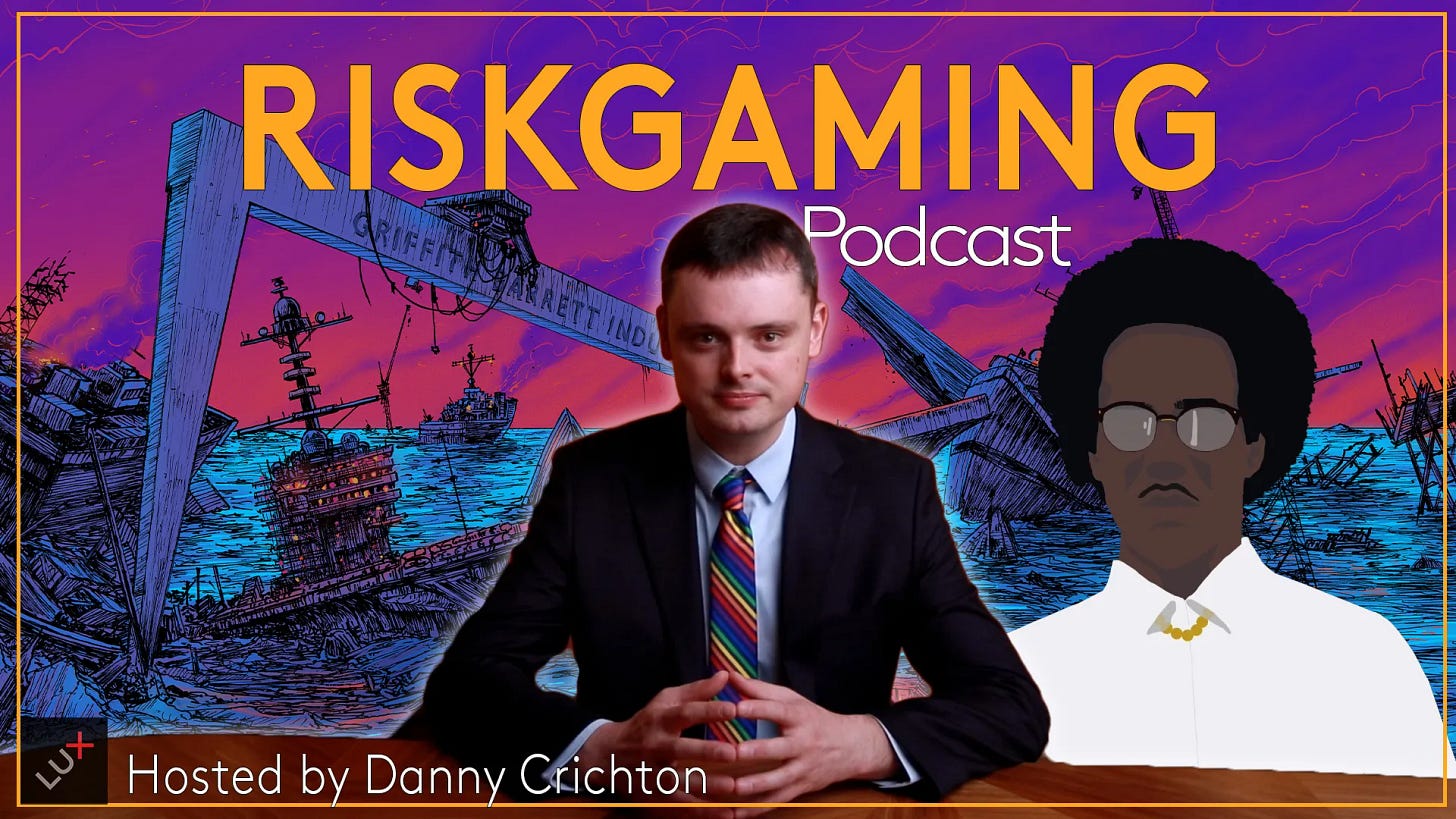The present and future of wargaming
Rwizi Rweizooba on game design, poker, and micro wargames
Riskgaming is part of a broader movement known as wargaming, playful experiences designed to improve decision-making across domains like defense planning, business leadership and competitive analysis. It’s a burgeoning field, and it has now attracted its very own publication in the form of the Substack newsletter Wargaming Weekly.
This week, I talk with the editor Rwizi Rweizooba Ainomugisha. He’s a wargaming fanatic based in Uganda, where he first started learning the gaming world in high school when he built an underground casino. He then discovered gamification while working in B2B marketing before eventually entering the wargaming world as a player and now as a designer of two micro-games. He’s also a co-founder of the gamified fintech startup, Lupiiya Books.
We talk about Rwizi’s background, how gamification is infiltrating all kinds of different fields, the rise of wargaming and the artificial delineations that still plague the field, the ebb and flow of strategic thinking, and finally, why solitairy games offer a unique on-ramp into this world.
This interview has been edited for length and clarity. For the full conversation, please subscribe to our podcast.
Danny Crichton:
So, Rwizi, you’ve launched a publication called Wargaming Weekly on Substack, covering this extremely niche part of defense policy planning and strategizing. I’m curious, how did you get into this field? It’s not something you sort of stumble upon easily.
Rwizi Rweizooba:
It’s especially peculiar given my location. I’m literally in Uganda, and here I am having a lot of opinions about what the U.S. Department of Defense should do.
My story of wargaming goes all the way back to my high school days. I had the blessing and the curse of attending a Catholic high school — arguably, the best Catholic high school in my country, St. Mary’s College Kisubi.
Typically, with Catholic high schools, you develop a double character. You have the character you present to the school administration and your parents, and then there’s who you are with the students. So for me, my naughtiest adventure as a student was when I started and ran an underground casino.
Danny Crichton:
That’ll get you rapped over the knuckles by the sisters.
Rwizi Rweizooba:
For us, it was the brothers! Looking back, it was a really risky adventure because, if I had been caught, it would’ve meant automatic expulsion. But the reason I did it was this: In our leisure time, we had a bunch of guys who used to play cards. I was never good at cards, and I wanted to have something where everyone was on a level playing field. I figured if we could start playing poker, which none of us understood, we’d all start from zero. So I went to the school library, picked up a few books, bungled my way through the rules, got a bunch of my friends to buy into joining me on the weekend. I was the dealer, they were the gamblers. I would basically guide them through my understanding of the rules.
Fast-forward a few years later, and I had dropped out of university and was working as a B2B marketing writer on Upwork. This was just a few years after the 2008 crash. Remote work was picking up, and I was making money, good money, as a B2B writer. Fast-forward about 10 again, and I met my most interesting client to date, the Octalysis Group. They’re basically one of the top, if not the top, gamification consultancies in the world, led by Yu-kai Chou, who’s the face of the company.
They hired me to do some SEO content writing, and I was hooked. My contact at Octalysis would give me assignments like content on gamification in healthcare or gamification in finance, and I’d research those. Eventually I asked him, “Why don’t we do something about gamification in government?” And he was like, “We’re not really interested in that because we are not interested in government clients. Their procurement process is lengthy and what have you.” But for me, it stayed in the back of my mind.
One day on my own time, I ended up typing in something like gamification in government or gamification in policy. And that led me to discover RAND’s wargaming. It blew my mind on so many levels because in my mind I was like, “These people were playing games about the end of the world, the most serious thing in the world, and they were figuring it out through games.” And that led me into the Georgetown University Wargaming Society’s YouTube channel, which is the most comprehensive online database of professional wargaming knowledge.
Last year, I started having a bit more time on my hands. AI has kind of killed the content market I’ve been working in, and I had reached a stage of my knowledge consumption where I felt like I needed to give back. So I started the newsletter. My initial thought was, “Let me just curate. Let me just create a weekly breakdown of buckets of wargaming information.”
But from there, I was like, “Okay, you’re not a wargamer if you’re just reading and writing about it. You have to play some games.” And then eventually I was like, “Okay, you’re not really a wargamer if all you’re doing is writing, reading and playing. You have to design.” So I started working on a wargame about Uganda’s heads of state. I put that out this year. And then I also put out a second game called African Election. So for me, this journey is all about my imposter syndrome and trying to prove to myself that I’m a real wargamer — but I keep moving the bar.
Danny Crichton:
It is interesting to hear that this started with poker. To me, poker is so static; the rules are fixed and you’re just trying to optimize your own play. The power of wargaming (and your own evolution) is the breadth. There are so many different domains, so many different tactics. I just love the diversity that comes out of this category beyond what you get in the poker world.
Rwizi Rweizooba:
I have to say, I quickly realized that I was not that good at poker. I was just as mad at it as I was at cards. But I love being a dealer.
What you said about wargaming is true. When I initially entered it, I thought, “Okay, here’s a nice small niche I’m going to be able to understand and cover within at most six months.” I quickly discovered that it’s huge. There are so many branches to wargaming, and I am going to have to find my own nice corner, get comfortable there, and give up on trying to eat the entire wargaming world because I can’t.
For example, there’s commercial wargaming and professional wargaming. I’ve kind of veered toward covering professional wargaming. But even within professional wargaming, there’s military wargaming and there’s business wargaming. Within military wargaming, there’s all these branches of educational wargaming, analytical wargaming. For me, it’s just a never-ending curiosity chronicle.
My mind is blown by the fact that games, which are the silliest thing — literal child’s play — are being used to investigate the most serious topics of our time.
Danny Crichton:
I’ve been to a number of wargaming conferences over the last couple of years, and one of the things I will say is that there is this opaqueness, this lack of transparency, that makes the field seem much more complicated and much more cloistered than it is. There’s no need for it.
When I think of these games — the commercial wargaming market, the professional market, stuff that the Pentagon does that’s classified — they’re all part of the same spectrum even with different goals and different motivations. But whether you’re targeting business, military, diplomacy, whatever the case may be, at the same time the goal is always to try to help people make better decisions under uncertainty.
Rwizi Rweizooba:
My mind is blown by the fact that games, which are the silliest thing — literal child’s play — are being used to investigate the most serious topics of our time. It’s really coming full circle, like the most silly thing meeting the most serious thing in this synthetic environment. It all makes perfect sense at the end of the day, but when you step back a bit, it’s hilarious.
Danny Crichton:
Yeah, one of the biggest challenges is pushback that you can’t have fun because it’s a serious topic. I have a completely different view, which is for adults, the reason we play is it allows us to explore experiences that otherwise we have no creativity to bear on. It opens up the aperture for us to say, look, I’m a CEO, I’m a general, I’m whatever I want to be. What decisions are possible?
I still have to defend gaming. I think the skepticism is built in — that there’s absolutely no way to have fun when you’re talking about war — but it’s also not to say you should be flippant about the subject. Obviously, there are real consequences to some of the decisions that come out of this. But if you want those decisions to be the best, the ones that improve people’s lives the most, having the creative flexibility of mind is critical.
Rwizi Rweizooba:
I’ve noticed that a lot of wargaming articles these days about trying to convince people that, hey, it’s okay to play a game to investigate these things. I look forward to a time when more wargaming articles are about the technicalities of wargaming, but it feels like we still have to work through this initial stage where it’s just about convincing people that we need to be wargaming again.
For me, that’s interesting because I thought it would be a given.
It’s so counterproductive to keep going through this building and destruction of knowledge, awareness, and practice.
Danny Crichton:
The other challenge is that there are just so many threats around the world, so much operational intensity. People are overwhelmed with the number of decisions they already have to make.
If you look at the history of wargaming since its genesis in the 1800s, the reality is it seems to go up and down based on the number of crises in the world. The last surge for the Pentagon was around the late Obama years. Robert O. Work was a big patron of wargaming across the defense community here in the United States, and when he moved on, there was no one to pick up the torch. So now it’s in recess. And a lot of institutions that would normally fund this are kind of in reverse. Someone else will come up, though, and then suddenly strategic thought will come back into the fore and people will need games again.
Rwizi Rweizooba:
It’s so counterproductive to keep going through this building and destruction of knowledge, awareness, and practice. And that’s one of the things that I talk about in my newsletter, the need for the cultural shift for wargaming to go really mainstream. People should be going on wargaming dates, people should be watching wargaming TV shows. That’s how proliferated it should be.
Danny Crichton:
With the rise of artificial intelligence, we’ve had a lot of engagement recently with universities thinking about the future of in-classroom education. So in a world in which you have LLM — you can basically do a lecture through ChatGPT; you can learn; you can write — what’s the purpose of a classroom experience?
We’ve talked to a couple of different universities, but people are increasingly seeing gaming as an experiential part of learning that could really transform the classroom from this sort of dry rote lecture, an education model that frankly dates back to the Greeks, to one where you can say, “Look, imagine a 20-person wargaming scenario played live in a classroom over three to four hours that helps you understand the complexities of logistics in the 21st century.” And now you’re getting beyond just reading some books. You’re getting into the actual dynamics in the real world.
Rwizi Rweizooba:
I’ve noticed some people even doing it for high school students. Clint Warren-Davey teaches at a Catholic high school in Australia. I’ve seen him teach wargame design to his high school students. I can’t tell you how jealous I am!
But like you said, with AI, now more than ever, we need analytical thinkers. And I don’t think we’re going to get those without games.
Micro wargames are going to change the field. They can fit in soldiers’ pockets and can be played in very compact spaces in very short spans of time.
Danny Crichton:
I’m curious: One of the things you’ve been doing with Wargaming Weekly is reviewing a lot of games. I want to hear about patterns you’re seeing.
Rwizi Rweizooba:
I’ve mainly played micro wargames, so that’s what I can confidently talk about. These are really a game changer because they compress the entry point for wargaming. They make it easier for someone who’s new to it to experiment. A lot of them are solitaire games, and because they’re designed to be completed within 20 to 30 minutes, it doesn’t feel like a huge commitment compared to the typical game.
I think they’re going to be great for getting more people into the pipeline. Sebastian Bae has about three collections of micro games. Fight Club has a collection. Even the Georgetown University Wargaming Society has a collection of its own on its website. The Women’s Wargaming Network has a micro game design that they’re planning to release later this month.
In the militaries, one of the big trends is an effort to get wargames down into the lower echelons, because traditionally wargaming has been for generals and up. So there’s now this drive to get wargaming down to the platoon level, to squad level. And I think micro wargames are going to be perfect for this. They can fit in soldiers’ pockets and can be played in very compact spaces in very short spans of time.
Danny Crichton:
We’ve only built interactive games, mostly because for us, Riskgaming is an opportunity to bring people together. I do think that if you want to learn strategy, it might be best to have opponents because human opponents help you sharpen your thinking.
But at the same time, if you’re learning something new for the first time, there’s absolutely no reason you need to start with an interactive game. A solitaire game that allows you to get into it at whatever speed you’re comfortable with is a unique experience. It is also true that the biggest challenge for us is always convening that group of people together. If people were actually willing to play and do it in a solitary fashion, then you potentially have the ability to enhance the thinking of millions of people.
Rwizi Rweizooba:
On the business side, I also think there’s an opportunity for business micro wargames to make a splash. You can say, “Okay, you don’t have a lot of time, but at the beginning of this one-hour meeting, can we play a quick 20-minute micro wargame about our supply chains?” And then that can guide the conversation at the meeting.
Another design trend I have noticed is commercial PME wargames, so professional military education wargames. Traditionally, it’s the military that gets commercial wargames and tries to use them for their officer training. But now that going in reverse, whereby games originally designed for professional military education are finding commercial success. The biggest example of this, of course, is Sebastian Bae’s Littoral Commander: Indo-Pacific.
So that trend is also very interesting to watch because it’s really bridging the two worlds, the commercial world and the professional world. Now there are games that are both fun and can deliver professional military education.
Danny Crichton:
Yes, I said it earlier: I think there’s been an artificial distinction here, and the idea that something is better by being hard to play is actually just a sign of a bad product. You can have tremendous intellectual depth with a game that is very easy to onboard. And honestly, it’s publications like yours that are popularizing gaming and pointing out that there’s a whole spectrum. You can play games solitary, as groups, or otherwise. You can play them in the military, outside of it. They’re applicable to all these domains.
And that leads to my last question: What’s next for you?
Rwizi Rweizooba:
Like I told you earlier, for me, Wargaming Weekly is a continuous series of fighting my imposter syndrome. To feel like a real gamer, next, I want to work in wargaming. I want to do some kind of consulting work in wargaming, whether it’s business wargaming or military wargaming. But even if that doesn’t pan out, as long as I am playing games every week, as long as I am watching wargaming webinars every week and writing about wargaming every week, I’ll be happy.








Regarding the topic of the article, I loved how gamification is infiltrating all feilds. So insightful.